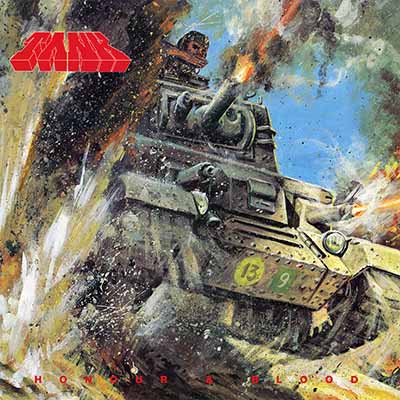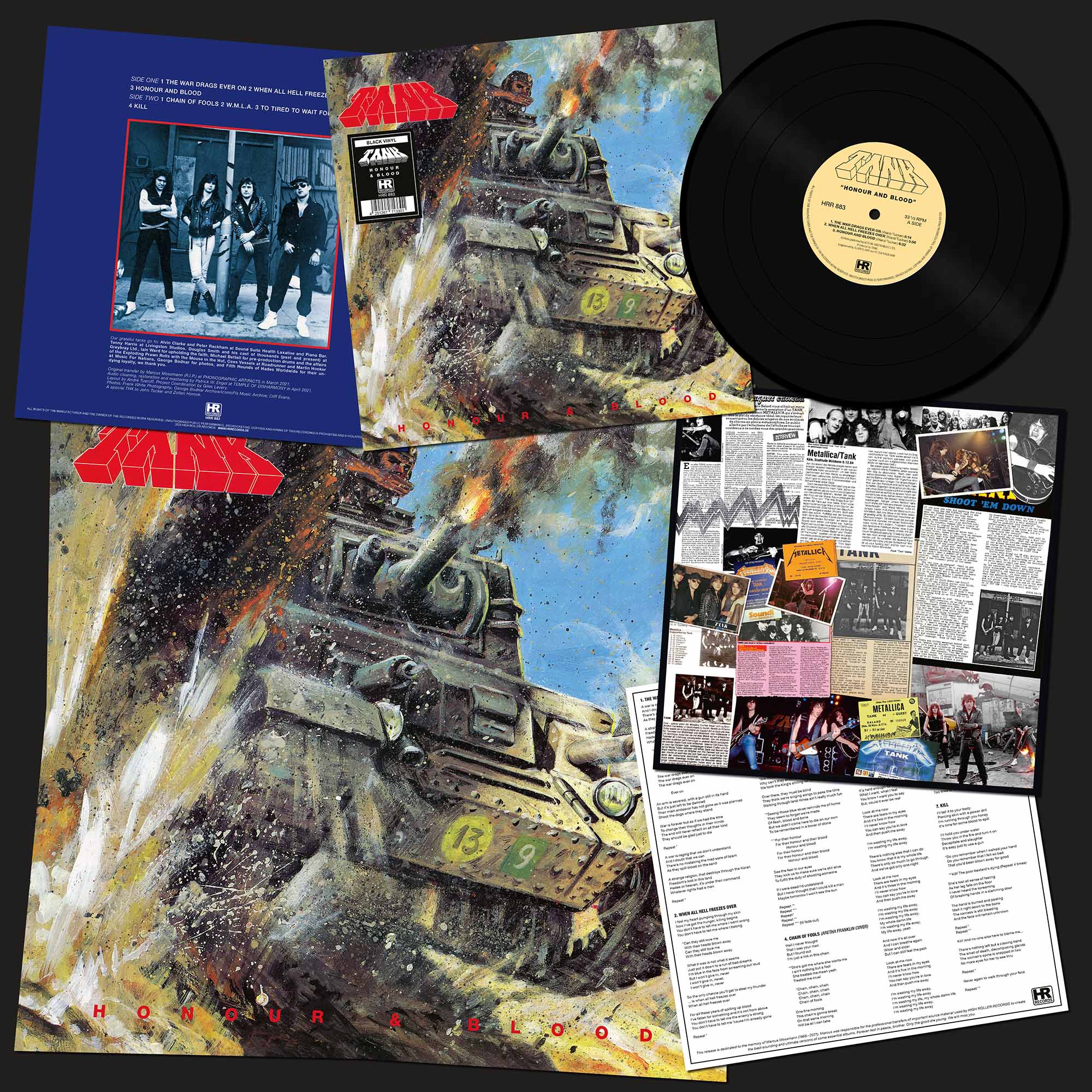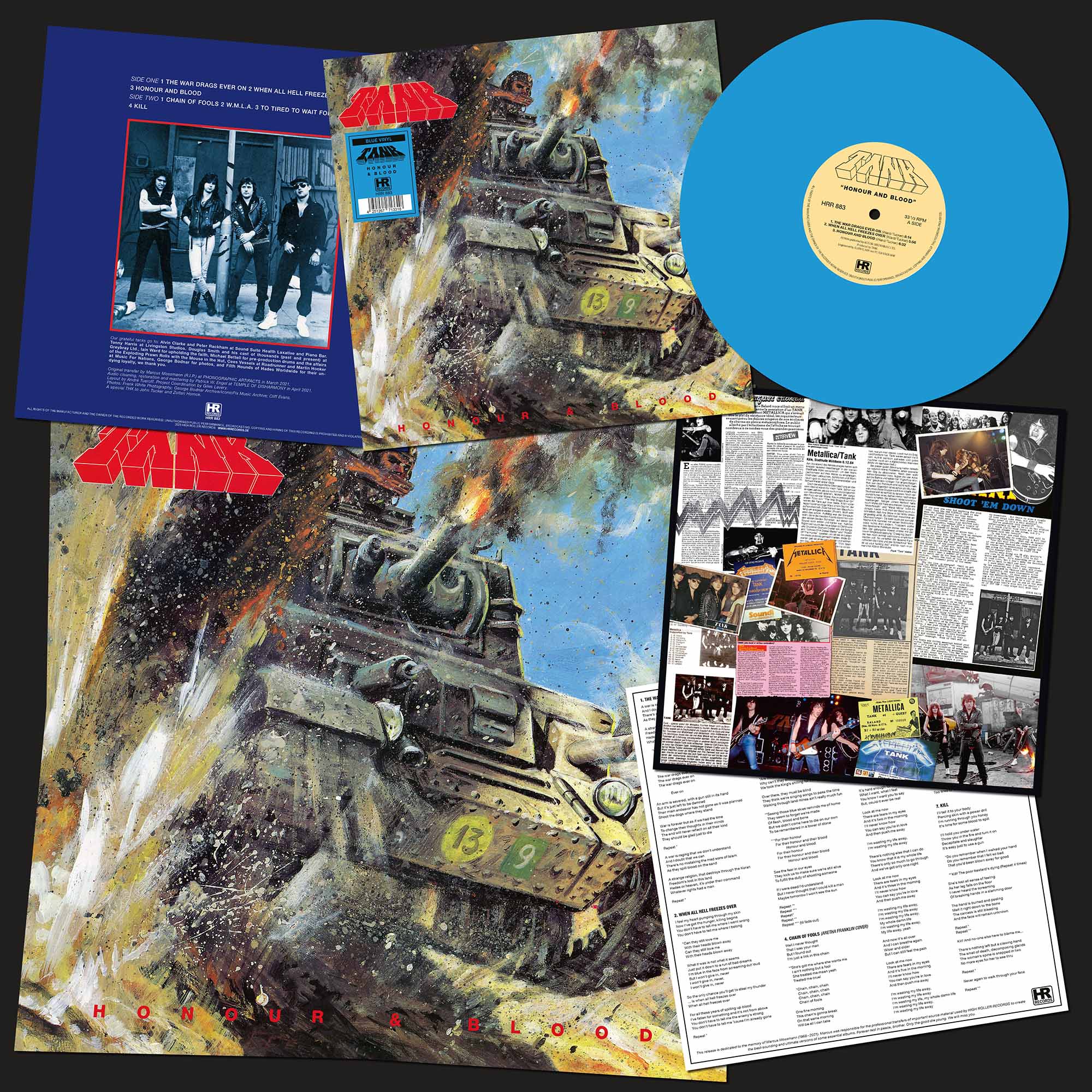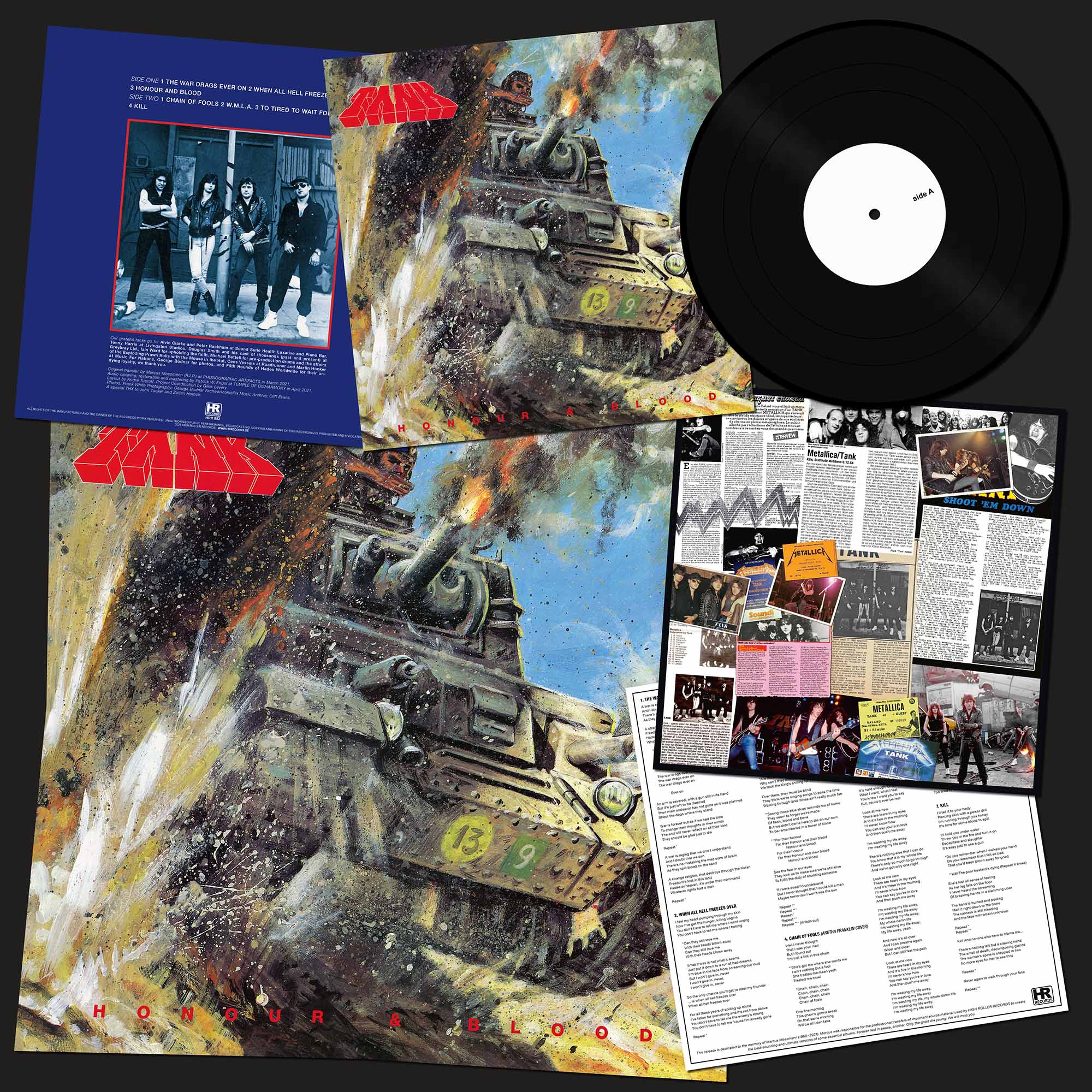 | ||||
| TANK - Honour & Blood LP | |
HRR 883LP, standard version, ltd 1000, 600 x black + 400 x cyan blue vinyl, insert, poster | |
| Algy Ward - Vocals, Bass Cliff Evans - Guitar Mick Tucker - Guitar Graham Crallan (R.I.P.) - Drums | |
| 01 The War Drags Ever On 02 When All Hell Freezes Over 03 Honour and Blood 04 Chain of Fools (Aretha Franklin cover) 05 W.M.L.A. (Wasting My Life Away) 06 Too Tired to Wait for Love 07 Kill | |
SOLD OUT! | |
Original transfer by Marcus Mossmann (R.I.P.) at PHONOGRAPHIC ARTIFACTS in March 2021.
Audio cleaning, restoration and mastering by Patrick W. Engel at TEMPLE OF DISHARMONY in April 2021. Cutting by SST Germany on Neumann machines for optimal quality on all levels...
The ultimate audiophile reissue of this eternal NWOBHM classic!
By the time Tank released their fourth album »Honour And Blood« in 1984, bassist/singer Algy Ward was the last remaining original member. He got in Graeme Crallan on drums, and added second guitarist Cliff Evans, who teamed up with Mick Tucker. Original guitarist Peter Brabbs and his brother Mark on drums had left the band in 1983. Mark explains why: “Well, my brother was having rock ’n’ roll problems, with drink and marching powder and all that sort of stuff. So this was another reason as well why we had been getting in another guitarist for »This Means War« because it was affecting his performance. So Algy and Mick got together and fired Peter. I said that’s not very diplomatic. I should have had a say as well as a founding member. But Algy said that even if I did have a say it would have been two against one, so they decided Pete had to go. So I stuck it out, not long, maybe a couple of months, and then I got an audition with AC/DC, thanks to Lemmy. But that’s another story...”
Although not playing on it, Mark Brabbs likes »Honour And Blood« a lot: “Yeah, yeah, it’s a good album. There’s a couple of tracks on there, which we had written as a band with my brother and me in as well. I think they have changed and re-recorded it but yeah, it’s a good album. ‘Honour And Blood’ itself is a good track.”
One of the two new guys playing on »Honour And Blood« was guitarist Cliff Evans, who had come in for Peter Brabbs. Cliff explains how he met Algy Ward the first time and became a member of Tank: “In the early 1980s I was working in a guitar shop in London called Boogie Music. It wasn’t far from the famous Marquee Club which was on Wardour Street in Soho. When Tank were playing at the Marquee they would always stop by my shop to pick up guitar strings and on one occasion I sold Algy a Gibson Thunderbird bass. We became good friends and I would often join them in the pub before going to see the show. In the summer of 1984 I was playing guitar with the legendary blues band called Chicken Shack. We had a show at the Golden Lion in Fulham and during the show I noticed that Algy and Mick Tucker were in the audience. Janick Gers, who was with Gillan at that time, was with them too. A few days later the guys came to my shop and we went to the pub. They explained that the Brabbs brothers had left the band and they were looking for a new guitarist to replace Pete Brabbs. We stayed in the pub until they chucked us out and we got extremely drunk. That was my audition and I was now a member of Tank.”
When Cliff joined the mighty Tank in 1984, he was already familiar with them as a band: “I had seen Tank many times at the Marquee and also supporting Motörhead at Hammersmith Odeon on the 'Iron Fist' tour in 1982. I was a big fan of the band and loved the music so it was a very proud moment when I became a member of Tank.”
Playing together with Algy, drummer Graeme Callan and guitarist Mick Tucker was no problem for Cliff Evans whatsoever: “I first played with the guys during the recording of the »Honour And Blood« album. We had already gelled together in the pub on several occasions so working together in the studio was no different. Especially as our studio sessions involved the consumption of large amounts of alcohol.
Mick played all the solos on the album. He’d already written them when I joined the band and I was happy to sit back and let him do what he does best. On every album after that we’ve always split the solos between us and try to incorporate twin lead harmonies as much as possible.
All the songs were already written and arranged by Algy and Mick. When I heard them I knew that his album was going to sound great and I was very excited to be a part of it. Algy and Mick worked so well together as a writing team but unfortunately this collaboration did not continue after this album.”
“The album was recorded at Sound Suite studios near Camden Town in London,” continues Cliff Evans talking about »Honour And Blood«. “Algy was in charge of production and Mick got a great guitar sound by putting his Gibson Les Paul through a tiny Marshall 12 watt combo amp with an 8 inch speaker. Amazing tone. The album has a lot of reverb added to the mix which gives the songs a live feel and sound. It really creates a lot of energy.
I think the album took us so long to record because we were getting drunk in the pub around the corner for most of the time. The pub was called The Brecknock and in the late 70s/early 80s I would go there to see bands such as Iron Maiden, Angelwitch and Urchin plus many of the other NWOBHM bands that were gigging at that time. It was a great pub. It’s now called the Unicorn and is once again a great rock venue.”
»Honour And Blood« kept the lengthy songs from »This Means War« but toned down the keyboards, whose decision was this? One could imagine that with songs like “When All Hell Freezes Over” or “Too Tired To Wait For Love” keyboards might have worked well.
“Mick was more involved with the writing on »Honour And Blood«,” remarks the guitarist, “so the songs were more focused on the guitar riffs to make the album sound heavier. Looking back now I think a couple of the songs might have benefited from some keyboard parts but we’ve had no complaints from our fans.”
“Chain Of Fools” was a cover version of a number, which was made famous by Aretha Franklin. According to Cliff Evans it was quite an odd decision: “It was a strange choice of song to cover but Algy was insistent we record it and listening to it now it does sound great. A really simple guitar riff but it works.”
Just like the three albums before, »Honour And Blood« was once again put out by Music For Nations, but somehow it did not seem to work out the way everybody hoped it would this time around: “We had recorded a great album and the line up was solid and tight. We were confident that this would be the album to really raise Tank to the next level but unfortunately our management didn’t share our vision. We had the same manager as Motörhead at that time and they would always be the main focus for promotion and investment. The label wasn’t promoting the album as much as they should have done but it was our manager’s fault for not looking after our interests. I guess it was just another bad decision by our management or the label to put out the album that late in the year in December 1984. It should have been released a couple of months before we hit the road with Metallica to maximise the build up before the tour and take advantage of all the promotional possibilities. This would have made all the difference to the band’s future. We’ve been plagued by bad luck all through our career.”
As mentioned, Tank supported Metallica on their “Bang That Head That Doesn’t Bang” tour throughout Europe for their album »Ride The Lightning« (25 dates between November 16th and December 20th 1984). Any specific memories about this tour? “That was the first full tour I’d ever done so it really was a very special time for me,” reminisces Cliff Evans. “We were well rehearsed and sounding tight. New Marshall JCM800 amps were bought and we were ready to rock. I remember walking into the venue for the first show of the tour which was in Rouen, France. Metallica were sound checking and I’d never heard anything like it before. They had a huge backline of Mesa Boogie amps which created the now legendary and unmistakable Metallica guitar sound.
I’d never heard anything like it and wondered if our Marshall amps could compete.
Fortunately they did and the tour was great for us. We became good friends with James, Lars, Kirk and Cliff and drank many beers together across Europe in the winter of 1984. Cliff Burton, RIP.
Regarding the setlist we went for a good mix of old and new but tried to pick songs that would go down well with the Metallica audience. We were very surprised at how many fans had come to see us on the tour and at several shows our fans equaled Metallica’s.”
Although not being in the band any more in 1984, former Tank drummer Mark Brabbs had run into the Metallica guys a few years earlier: “Again, that’s a funny story. We knew Metallica. Our manager had brought them over to England the first time and we took them out. And they were nothing. Just kids, you know. We got them very drunk, as you do. We went to a club called the St Moritz, just by the old Marquee club. We had just finished demoing the »Power Of The Hunter« album. So we put the cassette on in the club, because we knew the owner, for the guys to have a listen. So the guy put in on full volume and the four Metallica guys were sitting at the bar listening to the whole album with their hands folded. They didn’t talk. And when we were finished, James was saying: ‘This is exactly the sound we are looking for. This is what we want.’”


